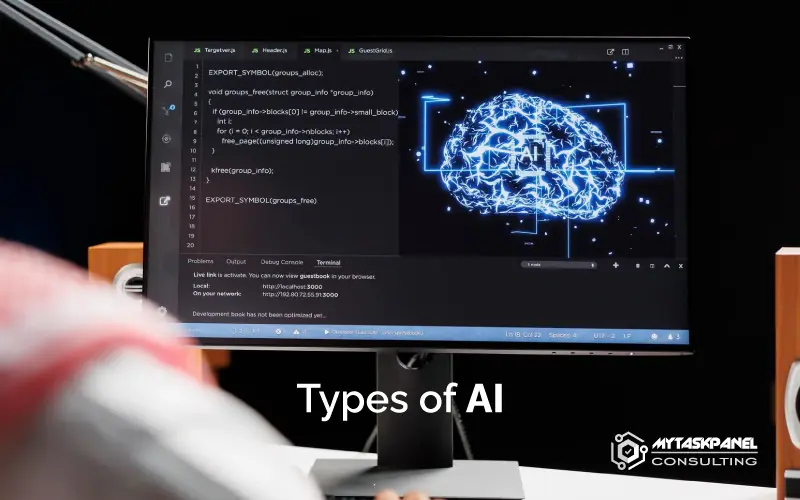Artificial intelligence has revolutionized multiple sectors, enhancing efficiency and transforming how we interact with technology. In this article, we will explore the five most applied types of artificial intelligence today, analyzing what each one is and their primary fields of application.
Expert systems
What are expert systems?
Expert systems are a type of artificial intelligence designed to emulate the decision-making ability of a human expert in a specific domain. They use a knowledge base and an inference engine to solve complex problems that typically require human expertise.
They excel in handling and processing large volumes of information, providing precise and efficient solutions in fields where human expertise is essential.
Fields of application
- Medicine: expert systems are used in diagnosing diseases and recommending treatments. For example, the MYCIN system was developed to diagnose bacterial infections and recommend antibiotics.
- Finance: in the financial sector, expert systems assist in risk assessment, fraud detection, and investment management.
- Legal advice: they are used to analyze contracts and legal documents, helping lawyers identify potential issues and legal solutions.
- Engineering: in engineering, expert systems can aid in the design and diagnosis of complex systems, such as electrical networks and mechanical systems.
Artificial Neural Networks
What are Artificial Neural Networks?
Artificial Neural Networks (ANNs) are computational models inspired by the structure and functioning of the human brain. They are composed of artificial neurons organized in layers and interconnected through synaptic weights. These networks can learn and generalize patterns from data.
In short, they are one of the most versatile technologies among the various types of artificial intelligence, offering innovative solutions in diverse fields.
Fields of application
- Image and voice recognition: ANNs are fundamental in pattern recognition in images and voice. They are used in applications like facial recognition and virtual assistants such as Siri and Alexa.
- Prediction and modeling: in the financial sector, neural networks are used to predict market trends and value assets. They are also employed in meteorology to forecast the weather.
- Medical diagnosis: ANNs assist in analyzing medical images, such as MRIs and X-rays, to detect anomalies and diseases.
- Automotive: in the automotive industry, neural networks are crucial for the development of autonomous vehicles, allowing them to interpret sensor data and make real-time decisions.
Deep learning
What is deep learning?
Deep learning is a subfield of artificial neural networks that uses deep network architectures with multiple layers of neurons. This type of artificial intelligence can learn complex data representations through an intensive training process.
It represents a significant evolution within the types of artificial intelligence, enabling the development of advanced and precise applications that were previously impossible.
Fields of application
- Natural Language Processing (NLP): deep learning has revolutionized NLP, significantly improving automatic translation, text summarization, and natural language generation capabilities.
- Computer vision: in this field, deep learning is used for tasks such as object detection, image segmentation, and facial recognition.
- Industrial automation: in the industry, it optimizes manufacturing processes, defect detection, and predictive maintenance.
- Cybersecurity: deep learning models are used to detect suspicious activities and threats in real-time, enhancing the security of computer systems.
Robotics
What is robotics?
Robotics is a field of artificial intelligence focused on the design, construction, and operation of robots. These systems combine hardware and software to perform physical tasks autonomously or semi-autonomously.
Robotics has a direct impact on our daily lives, facilitating tasks and improving efficiency in multiple sectors.
Fields of application
- Manufacturing and logistics: industrial robots are essential in production lines, assembly, and inventory management, increasing efficiency and reducing costs.
- Medicine: surgical robots enable operations with millimetric precision, improving outcomes and reducing patient recovery times.
- Space exploration: in this field, robots like Mars rovers collect data and conduct experiments in environments hostile to humans.
- Home assistance: domestic assistance robots help with tasks such as cleaning and elderly care, enhancing quality of life and autonomy.
Intelligent agents
What are intelligent agents?
Intelligent agents are software systems that can perform tasks autonomously, interacting with their environment and making decisions based on the information they receive. These agents use machine learning techniques to improve their performance over time.
They represent one of the most dynamic and applicable types of artificial intelligence, enhancing human-system interactions in a variety of contexts.
Fields of application
- Virtual assistants: virtual assistants like Google Assistant and Amazon Alexa use intelligent agents to understand voice commands and perform tasks such as setting reminders and controlling smart devices.
- E-commerce: in this field, intelligent agents personalize product recommendations and optimize online shopping experiences.
- Network management: in telecommunications, they monitor and manage networks, detecting and resolving issues automatically.
- Video games: intelligent agents create more immersive and challenging gaming experiences by controlling non-playable characters (NPCs) with realistic and adaptive behaviors.
The most applied types of artificial intelligence today—expert systems, artificial neural networks, deep learning, robotics, and intelligent agents—are transforming various sectors. Each has unique characteristics and applications that significantly contribute to improving efficiency, precision, and technological capabilities in different fields. As artificial intelligence continues to advance, we are likely to see even greater integration of these technologies into our daily lives and the functioning of society.










